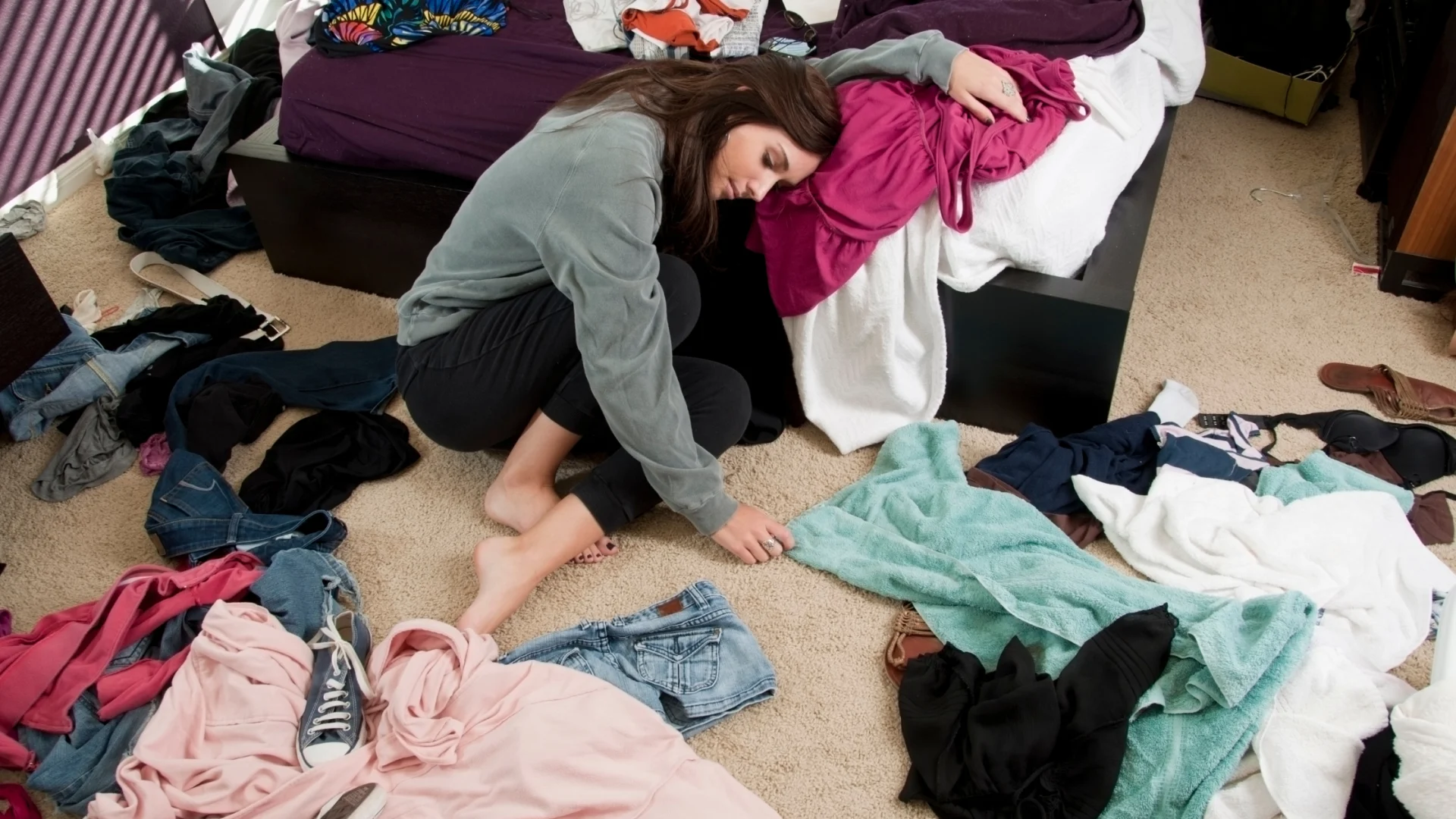Have you noticed being irritable or moody while your house is messy and dirty? Your home may have clutter because you don’t have time or are too busy to clean. However, a messy house is not beneficial for your mental state, while cleaning your home, according to studies, can improve your mental health in five ways. But does a clean house help depression?
Yes, a clean house can improve a person’s depression. Clutter, however, can affect your mood, productivity, sleep, ability to focus, anxiety levels, and much more. If you have been feeling depressed or anxious lately, assess whether your house is the problem. Is it clean enough that you can relax and have a good rest?
If you want to know how a clean (or dirty) home affects your mental health, you’ve come to the right place.
How Does a Messy House Affect Your Mental Health?
If you’re not convinced that a messy house affects your mental health, then you might need to read what the research has to say. According to a study by Catherine Roster and the Journal of Mental Psychology, clutter decreases one’s psychological well-being.
Clutter is described as an overabundance of material possessions, making the house seem chaotic. As such, it’s not surprising why a messy house damages a person’s mental wellness. Clutter can contribute to depression, stress, and increased cortisol levels.
The same study found that adolescents and teens who live in dirty houses tend to perform poorly in school. A disorganized home is associated with behavioral problems and low academic performance. Thus, it is clear that an untidy home negatively affects one’s mental health.
Does Clutter Contribute to Depression?
Yes, there is a link between messy spaces and clutter. Research suggests that the stress hormone cortisol for women is higher when the house is cluttered. Excess cortisol is associated with depression and other mental health conditions. When stress caused by clutter accumulates, one will feel depressed, less focused, and develop more unhealthy habits.
Why Do Most People with Depression Have a Messy Environment?

Depression makes it hard for people to focus, get things done, and take care of themselves. Keeping up with household chores, say washing the dishes or doing the laundry, can be daunting to someone experiencing depression.
If you have depression, be kind to yourself. Meanwhile, if you have a family member suffering from depression, be compassionate because, for them, a task can be nearly impossible to do.
An individual with depression may have the following symptoms which affect their ability to accomplish a task:
- Fatigue
- Decreased Energy
- Feeling Overwhelmed
- Lack of motivation or interest
How Does a Clean House Help Depression?
If untidiness and depression are linked, does keeping the house clean make a person better? Well, the answer is it depends. If the mess occurs because of depression, cleaning the house will make one very hopeful. It will promote a feeling of accomplishment and improve a person’s mood.
However, if a depressive person is used to clutter, trying to keep the home clean may not create a positive effect. One may need another self-care method to feel good.
However, according to Maggie Holland, a mental health counselor, if cleaning up will improve a person’s mood, then cleaning will help that person’s depression. It will result in a more improved endorphin and serotonin, the hormones responsible for your happiness, mood, stress, anxiety, and the like.
Does a Clean House Help Depression and Improve Mental Health?
Having a clean home is not only crucial for the sake of clarity but is also an instrument for one’s mental wellness. One study revealed that people who describe their homes as messy or cluttered are more likely to be depressed.
In comparison, people who describe their homes as “restorative” or “restful” are happier and more mentally stable. Research suggests that one is more optimistic by having a cleaning routine, as tidying up can boost a person’s self-esteem. To some extent, being organized signals to the brain that you have to achieve being orderly, which leads to feelings of affirmation.
Does a Clean House Help Depression and Improve Physical Health?
When you live in a dirty house, there is a constant reminder of what needs to be done. Too much mess will make you overwhelmed and feel stressed. When stress piles up, there is a higher risk of sickness.
A clean home can eliminate or reduce bugs, rodents, dust mites, mold, pet dander, and other bacteria-inducing clutter. Thus, a clean house can reduce asthma symptoms, allergies, and, most of all, the proliferation of germs.
What are the Advantages of Decluttering and Cleaning the House?
Research has established that decluttering and cleaning the house can positively impact a person’s mental health. Here are the many reasons why a clean home helps you destress.
Improves Mood
A clean house not only helps the cause of depression but also reduces anxiety. The Anxiety and Depression Association of America (ADAA) claims that the result of physical activities in cleaning the house reduces depressive symptoms and feelings of anxiety.
A clean house, especially clean sheets, will improve a person’s sleep. And when that person is well-rested, it provides a more improved mood and mental health benefits.
Ability to Gain Self Control
When people feel like their lives are uncertain or out of control, cleaning is the best way to assert control over their lives. Cleaning the house will give them a sense of mastery and control over their environment.
As such, when you’re feeling the urge to declutter your house, your body and mind are helping you bring that order into your life.
Increase Focus
When the house is dirty and unorganized, the chaos that such clutter creates will affect your ability to focus. The mess also impacts the way your brain processes information. In fact, according to research, people are more productive and less irritable and process information better when they are in an organized work area.
How to Clean the House While Being Depressed

Whether you are struggling with depression or have a chaotic life, keeping the house clean is merely out of your reach right now. With your current state of mind, the idea of cleaning up can be an overwhelming task.
However, cleaning up is probably worth pursuing, knowing that a clutter-free environment is good for your mental health. Here’s how you can manage your clutter and depression.
Start Small
It’s normal to be overwhelmed when the house is a mess. But taking small steps to clean the house can go a long way. Be comfortable cleaning your home little by little, and never force yourself to go full force.
Be Compassionate
When managing your messy room with depression, practice compassion for yourself. Take note that you are not a failure by having an unorganized home. Your body is feeling exhausted, and having a messy room is sometimes the reality of someone who is navigating depression.
Note Your Achievements
Make it a habit to track your progress every time you accomplish a task. Praising yourself, no matter how big or small the job is, is motivation to do more.
Ask for Help
If you are living with your family or have a partner to clean, cleaning the house with you may be precisely what you need. Sometimes the thought of cleaning the house is daunting, but having a cleaning partner will make a difference.
Or maybe you need a house cleaner to help you clean? Read our guide: Do You Need a House Cleaner – The Ultimate Guide to Determining If You Need a House Cleaner to find out.
Conclusion
If cleaning the house or being clutter-free improves your mood, make cleaning up a habit. After all, a messy home can be distracting. Make sure, though, that your cleaning routine is not a crutch. You don’t want to depend solely on cleaning to make your life better and in order.
Conversely, if you have depression or struggling with other mental health issues but long to have a tidy home, don’t pressure yourself that much and instead start cleaning the house little by little. It could be changing your bedsheets once a week or picking the clothes off the floor on other days.
You will feel less overwhelmed and more manageable with the little steps you take to organize your house. Just one day at a time, and you will be surprised how your mood improves for the better.
If you are interested in learning what else a clean house can do for you, check out our post – Can a Dirty House Make You Sick? Or Can a Messy House Make You Sick?

